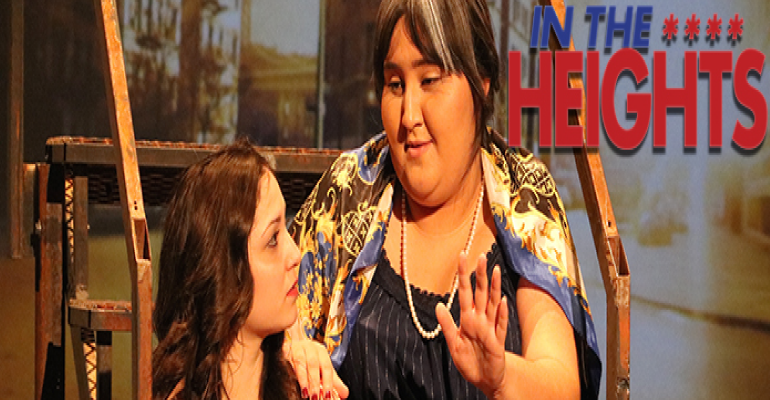
Pima Community College has been the center of a number of controversies in recent years, most recently helping to scuttle Monsanto’s desire for Foreign Trade Zone status and the big tax break that comes with it. The Governing Board, itself sometimes making negative news, voted 3 -2 not to support the giant GMO corn seed factory in the Avra Valley, setting the stage for the corporation’s withdrawal of its request for support from the Pima County Board of Supervisors. County officials are unhappy with PCC, to say the least, while residents of the Avra Valley cheered the vote.
This is a review of a musical put on by PCC’s Theatre Arts Program, yet art and politics have always been intertwined. Whatever controversies the school has, the Theatre Arts Department has been a shining light of success. They bring student productions of musicals, drama, classics and modern plays that are every bit as good as most theatres in the United States. At age 79 I’ve seen lots of theatre, on and off-Broadway in New York, in San Francisco and Tucson, and PCC is as good as it gets – and a lot cheaper!
“In The Heights” is a Tony-award winning musical written by and originally starring Lin-Manuel Miranda, the writer and star of the current Broadway hit “Hamilton” celebrating the founder of modern American capitalism. Miranda is New York-born of mostly Puerto Rican parents. “In The Heights” takes place in New York’s Washington Heights neighborhood, a mixed working class community when I lived there in the late 1950s, now a primarily Latino community of Dominican and Cuban immigrants and Puerto Ricans. While the native language of multiracial Puerto Ricans is Spanish, they are American citizens as a result of the island’s colonial history.
The story covers three hot summer days with the 2003 4th of July in the middle. Usnavi, the lead role created by Miranda, owns a bodega, a small store; there is also a car service, a hair salon and a piragua cart. Think raspados.
There is a graffiti artist, and a young woman who is the first in her family to go to college, all under the watchful eye of Abuela, an old woman who wins $96,000 in the lottery. There are employers and employees, including an African American car driver who falls in love with the student. It’s musical theatre, right, so there are several love stories woven through the more than twenty songs that carry the play. And the dancing is terrific!
Conflicts come with the closing of the car service and hair salon and with Usnavi’s decision to return to the Dominican Republic, compounded by the student’s decision to leave Stanford. There is a big power failure. The community is about to splinter with the main characters all heading in different directions, but the graffiti artist’s portrait of Abuela, who died the day before, pulls them back together for a big Finale, with Usnavi telling the players, and the audience, “I’ve found my island, I’ve been on it the whole time – I’m home!”
There is an interesting irony in a packed house in Tucson giving the cast a standing ovation, applauding a story of Hispanic immigrants at a time when the state, and much of the nation, wants to deport millions of Mexicans. “In The Heights” celebrates Spanish-speaking immigrants with no regard to how anyone may have gotten here, and that seemed to be all right with the audience. It is, perhaps, a reminder that we are all descended from immigrants who came with many languages and cultures.
Instead of the melting pot that some idealists envisioned, “In The Heights” brings us a part of a rich and spicy stew. Even while politicians fan the flames of anti-immigrant politics ethnic influence is a celebrated part of our culture. The community-at-large celebrates mariachi festivals, St. Patrick’s Day, Oktoberfest, Greek Festivals, Indian Pow-Wows, Columbus Day, Nordic Festivals, Cinco de Mayo, Chinese New Year, Gay Pride, Dia de Los Muertos, blues festivals, and more. Everyone enjoys fry bread, tamales, pizza, corned beef, salsa, yogurt, bagels, chow mein, tacos, bratwurst, couscous, catfish, churros, feta cheese and piraguas – excuse me, raspados — along with Big Macs and French fries.
“In The Heights” plays at Pima Community College’s West Campus Proscenium Theatre March 2, 3, 4 and 5. Tickets are $18, with senior and student discounts. The Box Office phone number is 520-206-6986. Tickets at the Box Office or online by going to https://www.pima.edu/community/the-arts/center-arts/index.html.
This production is directed by Todd Poelstra, with choreography by Mickey Nugent. Martha Reed is the musical director with Dr. Mark Nelson conducting the live orchestra. Student cast members are Lucas Rodriguez, Angelica Omelas, Jonathan Heras, Leticia Gonzalez, Jeffrey Baden, Taylor Falshaw, Hernán Gonzalez, Oksana Perez,Bianca Regalado, Nathalie Rodriguez, Cole Polwardowski, Rafael Acuňa, Sergio Munoz, Adrian Encinas, Marco Gutierrez, Marchus Lewis, Eduardo Rodriguez, Taylor Hernandez, Clarrissa Rodriguez, Molly Carrillo, Veronica Conran, Alyssa Furtado, and Savannah Martinez.
In the Pit Orchestra are Paul Scott, Lucy Huestis, Emile Blum, Martha Reed, Jodie Marx, Kay Wilson, Lawrence McIntyre III, Barbara Freischlad, Tony Martin, Roger Wallace, Jorge Castro, Rachel Hoblitt, Mike Blommer, Anita Hershey and D. Michelle Doyle.
Next season’s shows include “Tomás and the Library Lady,” a story of migrant workers and storytelling; “Popul VuH: The Story of Seven Macaw,” a retelling of the Mayan creation story; the musical “Priscilla, Queen of the Desert,” and a reimagining of the classic “Eurydice,” the Orpheus classic through the eyes of its heroine.
